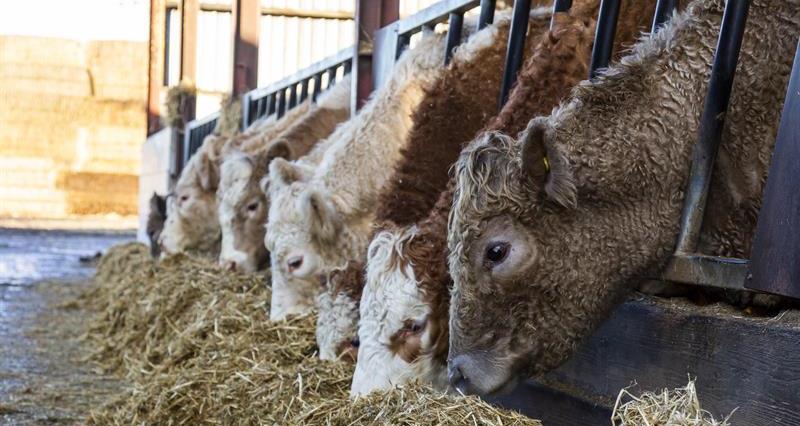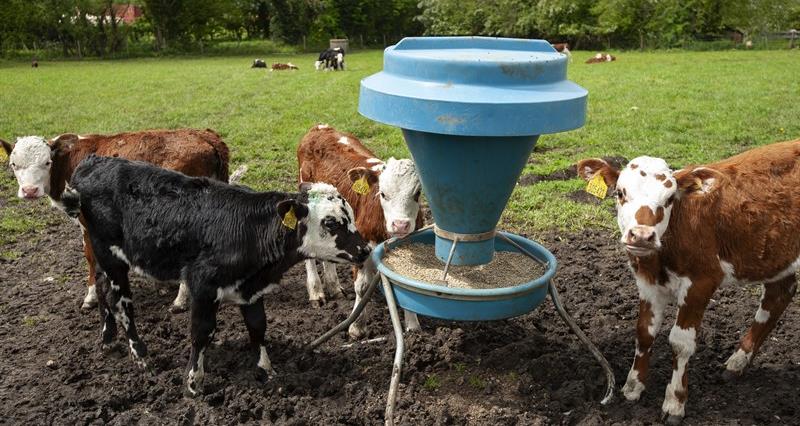The announcement about incentivisation came after a previous call for evidence in September 2022, which the NFU responded to. This consultation asked farmers to give their views on potential opportunities and barriers of MSFPs.
Currently, most MSFPs are either incorporated into a total mixed ration, for example seaweed or biochar, or top dressed onto feed. The majority of the compounds work to limit the cycle in the rumen that creates methane.
The impact of MSFPs on methane reduction is significantly affected by the animal’s diet at the time, with the biggest effect seen on those animals consuming a diet high in cereals compared to forage-based systems.
For the additive to be effective it also needs to be consumed at the same time as the normal diet. For this reason, the options for grazing ruminant livestock are limited until options such as a slow-release bolus or mineral block have been further considered.
It could also be difficult to measure methane reductions and the effectiveness of MFSPs in cattle that are part of extensive grazing systems.

Methane suppressing feed products – Defra commits to introduction
Risk assessment needed
The FSA is responsible for licensing all feed products for livestock and would have to carry out a robust risk assessment considering the impacts of each additive on animal health and welfare, food safety risks, risk to workers, wider environmental risks and the efficacy of an additive before licensing for use in feed to reduce methane.
Currently, there is only one product, 3-NOP (Bovaer®), licensed in the UK. However, other applications have been submitted and farm trials are ongoing.
Below is a table of some additives currently known to reduce methane in ruminant livestock and any associated information we have alongside them.
Additive table
|
Additive |
Synthetic or natural |
GHG % reduction claim |
Impacts on health or productivity |
Food safety impacts & approval |
|
Essential Oils such as garlic or citrus |
Natural |
Low |
Limited evidence of higher productivity & reduced fly burden anecdotally. |
None known, but can leave residual taste in the milk. |
|
Seaweed (asparagopsis) |
Natural |
High |
Damage to rumen wall has been seen. Improved feed efficiency. Algae based feeds can increase fat content of diets and reduce somatic cell counts in milk. |
Bromide and iodine residues in animal products. |
|
Biochar |
Natural |
Low |
Can improve quality of manure. |
None Know |
|
3-NOP |
Synthetic |
High |
Milk solids and proteins increased. |
Approved in 55+ countries including, the UK, the EU, Australia, Brazil and Canada. |
|
Nitrates |
Synthetic |
High |
Risk of toxin poisoning due to accumulation of nitrite (NO2). Little reason to expect improved productivity in nitrogen adequate diets, but it may provide an alternative to urea. |
Nitrite can also pass into the milk and urine which gives a bitter taste. Commercial feed-grade product SilvAir already available and in demos in Brazil and EU. |
|
Probiotics |
Natural |
Low |
Already used in dairy to increase yields and good evidence of increased productivity in beef but results can vary depending on other factors. |
Widely used in North America. |
|
Propionate Precursors (e.g., fumaric Acid, malate, aspartate) |
Synthetic |
Low |
Some studies show a very small increase in digestibility of food. |
CH4 reductions are linked to the amount fed in most circumstances but feeding substantial quantities has impacts. |
|
Antimicrobials or Ionophores.(Monensin illegal in UK) |
Synthetic |
Medium |
Methane reductions are only short term as the microbial population adapt to the changes. Increased feed efficiency |
Product a natural antibiotic and currently illegal for use in livestock production in the UK. |
